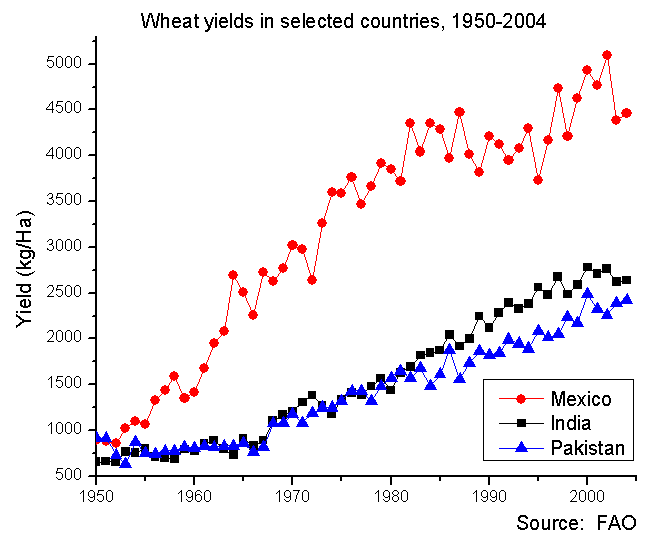March 25, 2014
Happy 100th Birthday - Dr. Norman Borlaug
UPDATE: I had forgotten that Penn & Teller did an excellent show on Dr. Borlaug. YouTube is posted at the end. Dr. Norman who? From Wikipedia:Norman Ernest Borlaug (March 25, 1914 � September 12, 2009) was an American biologist, humanitarian and Nobel laureate who has been called "the father of the Green Revolution", "agriculture's greatest spokesperson" and "The Man Who Saved A Billion Lives". He is one of seven people to have won the Nobel Peace Prize, the Presidential Medal of Freedom and the Congressional Gold Medal and was also awarded the Padma Vibhushan, India's second highest civilian honor.Some more:
Biologist Paul R. Ehrlich wrote in his 1968 bestseller The Population Bomb, "The battle to feed all of humanity is over ... In the 1970s and 1980s hundreds of millions of people will starve to death in spite of any crash programs embarked upon now." Ehrlich said, "I have yet to meet anyone familiar with the situation who thinks India will be self-sufficient in food by 1971," and "India couldn't possibly feed two hundred million more people by 1980."Ehrlich was a Malthusian and Malthusians are always dead wrong. More:
The initial yields of Borlaug's crops were higher than any ever harvested in South Asia. The countries subsequently committed to importing large quantities of both the Lerma Rojo 64 and Sonora 64 varieties. In 1966, India imported 18,000 tons �the largest purchase and import of any seed in the world at that time. In 1967, Pakistan imported 42,000 tons, and Turkey 21,000 tons. Pakistan's import, planted on 1.5 million acres (6,100 km�), produced enough wheat to seed the entire nation's wheatland the following year. By 1968, when Ehrlich's book was released, William Gaud of the United States Agency for International Development was calling Borlaug's work a "Green Revolution". High yields led to a shortage of various utilities � labor to harvest the crops, bullock carts to haul it to the threshing floor, jute bags, trucks, rail cars, and grain storage facilities. Some local governments were forced to close school buildings temporarily to use them for grain storage.Want an infographic?
In Pakistan, wheat yields nearly doubled, from 4.6 million tons in 1965 to 7.3 million tons in 1970; Pakistan was self-sufficient in wheat production by 1968. Yields were over 21 million tons by 2000. In India, yields increased from 12.3 million tons in 1965 to 20.1 million tons in 1970. By 1974, India was self-sufficient in the production of all cereals. By 2000, India was harvesting a record 76.4 million tons (2.81 billion bushels) of wheat. Since the 1960s, food production in both nations has increased faster than the rate of population growth. Paul Waggoner, of the Connecticut Agricultural Experiment Station, calculates that India's use of high-yield farming has prevented 100 million acres (400,000 km�) of virgin land from being converted into farmland�an area about the size of California, or 13.6% of the total area of India. The use of these wheat varieties has also had a substantial effect on production in six Latin American countries, six countries in the Near and Middle East, and several others in Africa.

Alas, today's Left has made him a non-person, because his work made a laughing stock of Paul Ehrlich's "Population Bomb". If only Borlaug had the foresight and wisdom to have been born African-American, or perhaps trans-gendered, all would have been forgiven.Sadly true... UPDATE: Penn & Teller on Dr. Norman Borlaug:
Comments
Post a comment